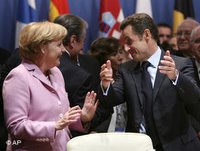
The Union for the Mediterranean, launched a year ago, was meant to revive cooperation between the EU and countries bordering on the Mediterranean. But little progress has been made on pressing issues in the region.
For almost 14 years now, the member states of the European Union have been working with 16 partners across the Southern Mediterranean and the Middle East on regional projects. This network used to be known as the Barcelona Process, but in 2008, it was re-launched as the Union for the Mediterranean, or Euromed, by the ever-industrious French President, Nicolas Sarkozy at the time of his European presidency.
Euromed is the only EU body in which both Israel and Arab states are represented, and if Sarkozy had prevailed, it would have only counted countries with a Mediterranean coastline among its members.
But German Chancellor Angela Merkel protested against this exclusive "Club Med" and eventually, she got her way. Sarkozy opened his Mediterranean Union to all 27 EU member states. At a short summit in Paris on July 13, 2008, 43 members officially joined Euromed.
"We know that we're not going to find solutions to all our problems in a single afternoon," Sarkozy told the summit participants. "But we're determined to look for suitable opportunities. We must succeed in building on this treaty. We must become an instrument of peace to serve our community on the Mediterranean."
 For her part, Merkel stressed that Euromed belonged to all EU states, even Sweden, Poland or Germany, which of course, don't have a border on the Mediterranean.
For her part, Merkel stressed that Euromed belonged to all EU states, even Sweden, Poland or Germany, which of course, don't have a border on the Mediterranean.
"This conference is a very, very good start for a new level of cooperation," Merkel said. "The Barcelona Process has been revived, and given a wholly new dynamic. I believe that all of Europe – with all its states - working with those Mediterranean countries which are not a part of the EU sends an important signal."
Energy, environment top priorities
Euromed foreign ministers met in November 2008 to discuss their areas of cooperation. They agreed that they should fund projects in the areas of energy security, higher education and research, and environmental protection, with a particular focus on fighting pollution in the Mediterranean Sea. They also planned to regularly discuss the political situation in the Middle East, and the fight against terrorism.
It was agreed that two ministers would preside over the meetings – one from Europe and one from a non-European Mediterranean country. For EU External Relations Commissioner Benita Ferrero-Waldner, this form of tangible cooperation signifies the real difference between the old Barcelona Process and the new Euromed.
"An important political impulse is coming from this new union," she said. "The Barcelona Process has a new name, and is incorporating our southern neighbors more, as shown by this co-presidency."
Barcelona was chosen as Euromed's administrative seat, and in Slovenia, a Mediterranean University has since been established. But many of the ambitious projects, which depend on state money and co-financing from private investors, have been mired down by the current financial crisis.
Politically, much of Euromed's work was stalled by Israel's military operation in Gaza at the start of the year. Now though, the Arab representatives are beginning to show an interest in returning to the table.
Progress slowed by crisis, war
 EU finance ministers met with Euromed's Egyptian co-chairman, Finance Minister Youssef Boutros-Ghali. But following the meeting, Swedish Finance Minister Anders Borg, whose country holds the EU presidency, had only well-worn phrases to offer.
EU finance ministers met with Euromed's Egyptian co-chairman, Finance Minister Youssef Boutros-Ghali. But following the meeting, Swedish Finance Minister Anders Borg, whose country holds the EU presidency, had only well-worn phrases to offer.
"Euromed is, of course, very important for the European Union," Borg said. "It was clear in our discussions that it's very important to move forward with reforms. There are clear reports that, on the southern coast of the Mediterranean, much progress has been made in reforms. And the cooperation among the southern neighboring countries has improved."
Political analyst Daniela Schwarzer of the German Institute for International and Security Affairs says that, on balance, not much was achieved during Euromed's first year. The region faces big problems such as a growing migration crisis and a widening prosperity gap, but there have been no political answers, she wrote in an article for the newspaper Das Parlament. Euromed hasn't made the quantum leap France was hoping for, she concluded.
Now, with Sweden at the helm of the EU presidency, there's not likely to be a spike in interest in Mediterranean affairs. The Swedes are much more interested in the problems facing the EU's neighbours to the east. Sweden and Poland, for example, decided to form an eastern partnership which was made official in May at a summit in Prague.


